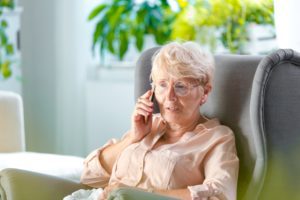Coping with the Loneliness of Social Distancing

The social distancing and lockdown guidelines currently mandated by our federal, state, and local governments are intended to flatten the coronavirus curve in an effort to protect our most vulnerable (the elderly and immuno-compromised), while also giving hospitals time to build up supplies and develop caregiving strategies.
This effort to bolster the physical health of our seniors, however, can ironically take a tremendous toll on their mental health. Social distancing is creating an untold loneliness crisis, particularly among older people and those who live alone.
Social isolation and loneliness have been linked to higher risks for a variety of health problems, including high blood pressure, anxiety, depression, cognitive decline, Alzheimer’s disease, and even death. For this reason, it is critical to find ways to combat the negative psychological impact of this extended period of social distancing.
Younger generations are turning to technological tools such as Zoom, FaceTime, or Skype to help them work, socialize, and cope, but many older people don’t understand how to access or use these platforms. If possible, family members or local caregivers (if family lives out of state) should get their loved ones set up with these tools and teach them how to use them. Video chat platforms like these are even better than regular telephone calls, as they enable the parties involved to see each other’s facial expressions and feel like they are actually “visiting.”
Additionally, there are other ways to safely visit the elderly in your life. You could drive over to their house or living facility and wave through the window while talking to them on the phone. You could bring over the grandchildren to play in their yard while they remain safely inside, watching the activity through the window or from the door or deck. It’s amazing how simple contact like this can raise the spirits of a senior who is otherwise homebound.
Here are some other ways for the elderly to combat the loneliness inherent with battling a global pandemic:
Set up regular communication times with your loved ones, whether through telephone, video chats, email, or even writing letters. This gives you something to look forward to and also brings a sense of normalcy and routine back.
Set small goals to work towards. This can help take your mind off your loneliness and provide a feeling of accomplishment. The goal could be as simple as finishing a book you started, picking up a sewing project, or organizing old family photos.
Escape into the world of fiction. Pick up a great book or get into a riveting movie. Those that are done well create believable characters that we can relate to and bond with, allowing them to become our surrogate “friends” while our actual socializing is limited.
Get outside. While the lockdown guidelines suggest or require you to stay home, that doesn’t have to mean staying indoors. As the warmer weather arrives, this is a great time to begin working in your yard or planting a garden. Take a walk, sit on your porch, or wave to your neighbors.
Stay as physically active as possible. There are fitness shows online and on television, as well as exercise DVDs, if you’re up to that level of working out. If not, even simple stretches or cardio like walking up and down stairs will help keep your body in good working order and give you a release of feel-good hormones.
Concentrate on building up your immune system by eating nourishing foods and drinking plenty of water. It’s easy to turn to comfort food to deal with the emotional aspect of social distancing, but right now it’s more important than ever to be sure you’re doing what you can to improve your immune system so you’re less vulnerable to the virus.
Educate yourself on your local healthcare options. Understand that while your health professionals may not be available to see you in person right now, you can still contact them if needed. Many doctors and hospitals are trying to avoid in-person visits or are busy dealing with COVID-19 patients. That doesn’t mean that your needs aren’t important, however. You may still be able to see your doctor through telehealth (video chats), or you can speak to them by phone or send them an email.
Dial down the bad news. While it’s important to stay informed about what is happening in our country and around the world, too much negativity can become overwhelming. Try to limit your exposure. Perhaps watch the news for 15 minutes a day, and then focus on other activities that keep you happy.
Don’t be afraid to ask for help. If you (or your loved one) need extra assistance right now, be sure to reach out. Cahoon Care can provide vetted caregivers who will offer companionship or assistance with daily activities or errands. If you need a grocery pick-up, don’t try to venture out alone. Ask a neighbor or family member for help. If your mental state drops precipitously, call someone to talk about how you’re feeling. If you don’t know anyone personally that you can speak with, you can call a hotline such as the Substance Abuse and Mental Health Services Administration’s Disaster Distress Helpline.
Remember that this situation is only temporary. While it’s necessary right now to save lives, it won’t go on forever. There will be an end in sight, even if we don’t know when that will be yet. Remind yourself that you won’t be cut off from your support system and loved ones forever. Embrace the opportunity now to invest in yourself by completing a project or learning new technology that helps you connect to others.
